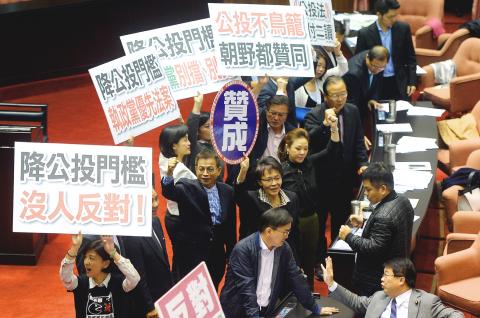The Democratic Progressive Party (DPP) yesterday voted down the Chinese Nationalist Party (KMT) caucus’ motion to give a second reading to a bill to amend the Referendum Act (公民投票法), proposed by a KMT lawmaker who said his version is based on a previous proposal by the DPP.
KMT legislative caucus convener Sufin Siluko (廖國棟) yesterday morning said that the KMT would propose to give the bill a second reading, adding that the party had to seek alternatives due to the legislature’s Internal Administration Committee dragging its feet.
Sufin said that if the bill was passed yesterday, a referendum on lifting the ban on imports of food products produced in Japanese prefectures surrounding the Fukushima Dai-ichi nuclear power plant could be held in the second half of next year.

Photo: Lin Cheng-kung, Taipei Times
The announcement came after KMT Vice Chairman Hau Lung-bin (郝龍斌) launched a campaign calling for a referendum to ask the public whether it supports a proposal to ease the nation’s ban on imports from the five Japanese prefectures.
The government had been rumored to consider lifting the bans on food imports from Fukushima Prefecture, reportedly due to political pressure.
The proposed amendment, motioned by KMT Legislator Alex Fai (費鴻泰), seeks to lower the signature threshold from 0.5 percent to 0.01 percent of the electorate to initiate a referendum proposal, lower the threshold to put a referendum proposal to a vote from 5 percent to 1 percent of the electorate and deciding on the outcome of the vote by a simple majority among more than a quarter of the electorate.
The lowering of the thresholds has also been the DPP’s and the New Power Party’s aim, but Fai’s version also proposes to have a referendum proposal initiated with the signatures of at least a quarter of the 113 lawmakers, which could be achieved with the KMT’s 35 seats at the legislature.
The DPP and the People First Party (PFP) legislative caucuses both voted down the KMT’s proposal.
DPP legislative caucus whip Wu Ping-jui (吳秉叡) said that the party, while in favor of lowering the referendum threshold, wanted the draft amendments to be reviewed by the committee first.
DPP caucus whip Ker Chien-ming (柯建銘) said “a quarter of lawmakers” means the KMT caucus, which is less than one-third of the total, would be able to initiate a referendum proposal whenever it wants, “which would only give way to chaos.”
PFP legislative caucus convener Lee Hung-chun (李鴻鈞) said the party is against the proposal, as lowering the threshold would make referendums easy to hold and could lead to a waste of public resources as well as hampering governmental efficiency.
Committee convener Chao Tien-lin (趙天麟) said the committee had made plans to review the draft amendments this month at the latest, adding that the DPP should not put emphasis on the KMT’s proposal.
It is probably a side effect of the KMT’s infighting over the party chairperson election in July next year, Chao said.
Additional Reporting by Alison Hsiao

SECURITY: As China is ‘reshaping’ Hong Kong’s population, Taiwan must raise the eligibility threshold for applications from Hong Kongers, Chiu Chui-cheng said When Hong Kong and Macau citizens apply for residency in Taiwan, it would be under a new category that includes a “national security observation period,” Mainland Affairs Council (MAC) Minister Chiu Chui-cheng (邱垂正) said yesterday. President William Lai (賴清德) on March 13 announced 17 strategies to counter China’s aggression toward Taiwan, including incorporating national security considerations into the review process for residency applications from Hong Kong and Macau citizens. The situation in Hong Kong is constantly changing, Chiu said to media yesterday on the sidelines of the Taipei Technology Run hosted by the Taipei Neihu Technology Park Development Association. With

CARROT AND STICK: While unrelenting in its military threats, China attracted nearly 40,000 Taiwanese to over 400 business events last year Nearly 40,000 Taiwanese last year joined industry events in China, such as conferences and trade fairs, supported by the Chinese government, a study showed yesterday, as Beijing ramps up a charm offensive toward Taipei alongside military pressure. China has long taken a carrot-and-stick approach to Taiwan, threatening it with the prospect of military action while reaching out to those it believes are amenable to Beijing’s point of view. Taiwanese security officials are wary of what they see as Beijing’s influence campaigns to sway public opinion after Taipei and Beijing gradually resumed travel links halted by the COVID-19 pandemic, but the scale of

A US Marine Corps regiment equipped with Naval Strike Missiles (NSM) is set to participate in the upcoming Balikatan 25 exercise in the Luzon Strait, marking the system’s first-ever deployment in the Philippines. US and Philippine officials have separately confirmed that the Navy Marine Expeditionary Ship Interdiction System (NMESIS) — the mobile launch platform for the Naval Strike Missile — would take part in the joint exercise. The missiles are being deployed to “a strategic first island chain chokepoint” in the waters between Taiwan proper and the Philippines, US-based Naval News reported. “The Luzon Strait and Bashi Channel represent a critical access

Pope Francis is be laid to rest on Saturday after lying in state for three days in St Peter’s Basilica, where the faithful are expected to flock to pay their respects to history’s first Latin American pontiff. The cardinals met yesterday in the Vatican’s synod hall to chart the next steps before a conclave begins to choose Francis’ successor, as condolences poured in from around the world. According to current norms, the conclave must begin between May 5 and 10. The cardinals set the funeral for Saturday at 10am in St Peter’s Square, to be celebrated by the dean of the College